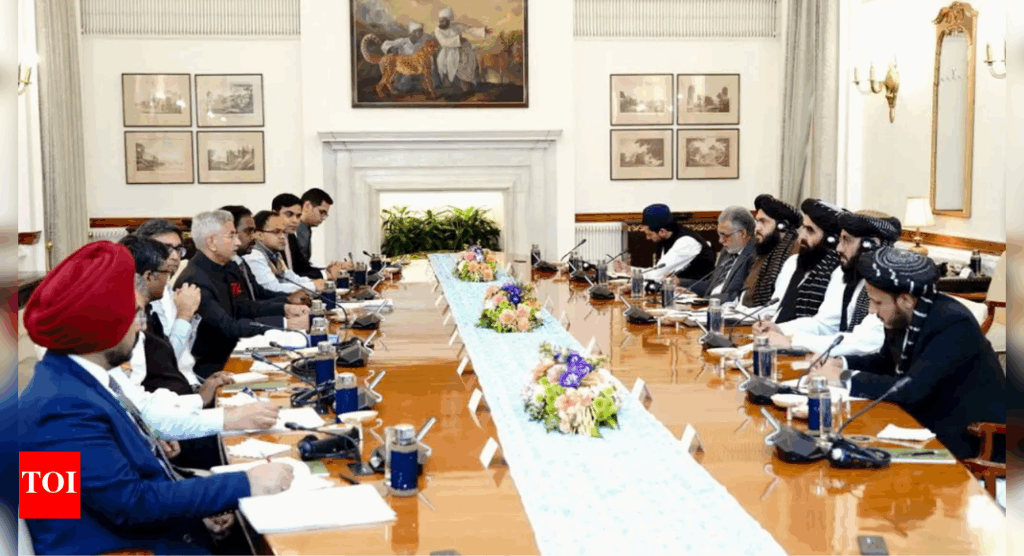
India is set to elevate its technical mission in Kabul to an embassy, marking a significant step in its diplomatic relations with Afghanistan. This development follows the visit of Taliban Foreign Minister Amir Khan Muttaqi to New Delhi, where both nations announced new projects and humanitarian aid initiatives for Afghanistan. The move underscores India’s commitment to Afghanistan’s sovereignty and aims to bolster diplomatic and economic ties between the two countries.
The announcement was made during a meeting between India’s External Affairs Minister S. Jaishankar and his Afghan counterpart Amir Khan Muttaqi. During the discussions, both sides condemned cross-border terrorism and emphasized the importance of regional stability and resilience. The upgrade of the mission to an embassy is not a formal recognition of the Taliban regime but signifies a substantial boost in diplomatic engagement.
Historical Context and Diplomatic Shifts
India had previously closed its embassy in Kabul following the Taliban’s return to power in 2021. However, in June 2022, a technical team was positioned at the embassy to oversee the distribution of humanitarian aid. The recent decision to reopen the embassy is seen as a strategic move to enhance diplomatic ties and support Afghanistan’s national development.
Over the years, India has maintained a development partnership with Afghanistan, contributing to over 500 projects across all 34 provinces. This longstanding relationship has been pivotal in fostering goodwill between the two nations, even amidst political upheavals.
Addressing Security Concerns
During the meeting, Jaishankar highlighted India’s concerns about cross-border terrorism, particularly from Pakistan-based groups with potential links in Afghanistan. Muttaqi assured that the Taliban would not permit any group to use Afghan territory against other nations. Both sides issued a joint statement condemning terrorism and underscoring the need for peace and mutual trust in the region.
“We have a common commitment towards growth and prosperity. However, these are endangered by the shared threat of cross-border terrorism that both our nations face. We must coordinate efforts to combat terrorism in all its forms and manifestations,” said Jaishankar.
With the Taliban’s relations with Pakistan deteriorating over the activities of Tehreek-e-Taliban, this assurance from Muttaqi is seen as a positive step towards regional stability.
Economic and Humanitarian Initiatives
In addition to diplomatic discussions, the meeting also focused on economic cooperation. Muttaqi invited Indian companies to invest in Afghanistan’s mining sector, which could strengthen bilateral trade and commercial relations. India expressed its willingness to assist in rebuilding residential areas affected by recent earthquakes and to support Afghan refugees in their resettlement efforts.
Jaishankar announced the launch of six new development projects in Afghanistan, reaffirming India’s commitment as a neighbor and well-wisher of the Afghan people. The projects include healthcare improvements, public infrastructure, and capacity-building initiatives, such as the establishment of a thalassemia center and maternity health clinics.
“As a contiguous neighbor and a well-wisher of the Afghan people, India has a deep interest in your development and progress,” stated Jaishankar.
Cultural and Educational Exchanges
The discussions also touched upon cultural exchanges, with a particular focus on sports. Jaishankar praised the emergence of Afghan cricket talent and committed to expanding opportunities for Afghan students to study in India. This includes more Indian visas for Afghans in medical, business, and student categories.
Additionally, India announced a donation of 20 ambulances, MRI and CT scan machines for Afghan hospitals, and vaccines for immunization and cancer medicines. These contributions are expected to significantly boost Afghanistan’s healthcare system.
The reopening of India’s embassy in Kabul and the accompanying initiatives represent a renewed chapter in Indo-Afghan relations. As both countries navigate the complexities of regional politics, these steps are seen as pivotal in fostering peace, stability, and mutual prosperity.






